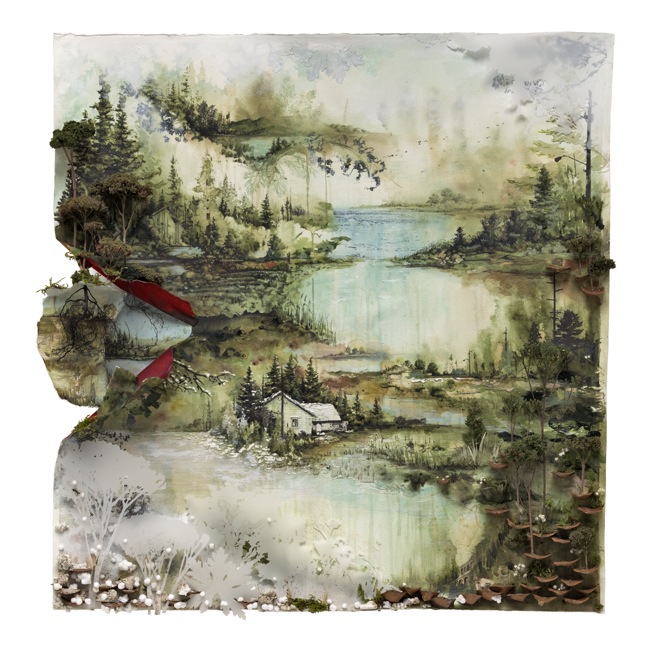Justin Vernon’s beginnings as Bon Iver have been repeatedly mythologized – often as a distracted pretext to the man’s work, managing to become an archetypal cliche for allusive solo-artist majesty and idealistic press-kit talking points. Cabin/Wisconsin/woods. Got it. But it’s only been three years since Bon Iver’s debut For Emma, Forever Ago and Vernon seemed to move on from his genesis as an indie poster child for isolated post-breakup snow covered laments before we did. He quickly followed Emma with a four-track EP that proved he could wring just as much emotional aplomb from beyond the walls of a cabin and that perhaps “folky” wasn’t necessarily the sole descriptor for Bon Iver. 2009 also saw a collaboration with Collection of Colonies of Bees as the more experimental Volcano Choir. 2010 cemented Vermon as a crossover heavyweight as a member of the Minneapolis soft rock/R&B supergroup Gayngs and, more importantly, the appearance in vocal and sample form on Kanye West’s My Beautiful Dark Twisted Fantasy. The point that was repeatedly being made by Vernon’s minor ubiquity was that, beyond any built-in storybook pretension, the dude can fucking sing.
Of course, some consistently defining elements arose in Vernon’s sparse arrangements as well: a unique interest in minimal repetition, scattered plucky textures, freewheeling percussion. But it wasn’t until the track “Woods” off Blood Bank (love it or hate it for its unabashed use of auto-tune) that the larger world seemed to officially recognize Vernon’s killer falsetto and knack for derived vocal melody as his defining facet. The track itself was used in three places – one being the aforementioned Kanye West album. Vernon has been able to redefine his place and offerings in the past couple years, making the onset of his first full-length since Emma the first solidified individual statement from the man under the Bon Iver moniker.
Bon Iver, Bon Iver could easily be rendered as the amalgam of Vernon’s sonic interests from the last few years – even committing more vigorously to AM radio underpinnings than Gayngs did – but ultimately it’s a singular and whole experience removed from anything previously heard from the artist. The title, Bon Iver, Bon Iver might seem laughably indulgent without context – it’s meant to be a city, state (or city, country) stylization, speaking to a conceptual interest in place and setting. But Bon Iver, Bon Iver is a record more indebted to mood than any tangible aspirations. Lyrically, it can be a pretty confounding and pastel affair, and it becomes apparent that Vernon has left the overtly topical meditations behind for something more esoteric and impressionistic.
The cloudy guitars that open “Perth” evoke a misty 5am dew-covered landscape beneath an overcast dawn and Vernon goes onto paint an abstractly imagistic scene. The most grounded and resounding lyric on the track is “This is a place, not yet awake,” which works like a heavily thrumming chord in the midst of lines like “still alive who you love” and “in a mother, out a moth.” So, okay, these lyrics are meant to be texture rather than guide, but even so, Vernon’s pastoral falsetto grounds things into the realm of tearful longing and heart rending displacement. It’s about memories of places – real and imagined – and complacently lingering within them. Those moments of clarity do crop up and they’re all the more sonorous for their sparseness.
Bon Iver, Bon Iver uses a widely eclectic sonic pallet to deliver its colorfully landscaped atmosphere – usually finding ground with crisp Angelo Badalamenti-esque guitars, and moving into a varied array of vertical offerings with chamber arrangements, chimey soft-rock synths, texturally frantic drumming, and submerged backing vocals. The record never really sticks to any one instrumental template, yet it remains quite atmospherically consistent. “Minnesota, WI” moves from a dubby cascading opening to a synth and vocal interlude that gives way to some quickened finger picking and a mournful slide guitar; that then moves to some stomping percussion and distorted bass punches. “Perth” likes its brass, “Holocene” its hand claps and liquid barely-there saxophone. The minimal “Hinnom, TX” floats around a huge tremolo pluck backed by a wash of synths. “Wash” uses the same type of piano repetition as “Babys” from Blood Bank, but backs it with a chorus of strings and a distant slide guitar.
Vernon has never been one for rigid pop craft, though Emma did have its choruses. Bon Iver, Bon Iver settles itself around a more narrative structure, letting the baroque arrangements move from one destination to another. Lyrical motifs might sometimes land more than once across a track, creating the feeling of continuous travel both temporal and geographical, but each time they’re recontextualized by their differed placement. The songs are always languid and fluid with resounding punctuations of a quietly repressed and yearning undertone. It’s a rich and intricate collage that shows restraint in its cascade of ideas as well as Vernon’s maturity as a songwriter.
The varied aesthetic and instrumental choices are of course tied together by the quietly beautiful vocals. Vernon mixes the differently pitched approaches of his voice at various levels in the mix–the central being the falsetto. It’s a wise approach of isolation and emphasis, and makes it apparent that without Vernon’s idyllic vocalizations, all of this might just remain disparately flat. Closer “Beth / Rest” is where the element of unabashed soft rock gets worn to the teeth with sax and guitar indulging in a bit of far-off dueling cheese wankery while a pillowy piano pounds itself out in the foreground and Vernon is set on convincing us this is the anthem of sincerity, not irony. And it works.


